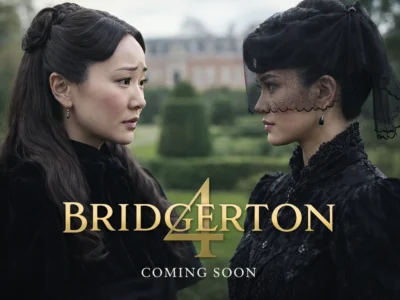With the release (and almost universally positive reception) of Dune: Part Two, fans of Frank Herbert’s seminal sci-fi novel can finally breathe easy knowing that Denis Villeneuve’s sprawling, brutalist take on the “unfilmable” book is complete.
But in its closing minutes, Villeneuve zigs where most other adaptations zag. Rather than positioning Paul Muad’Dib’s (Timothee Chalamet) successful overthrow of the Imperium that doomed his family to genocide as a rousing victory for the forces of good, Part Two practically builds to a cliffhanger.
In the film, Paul’s prophecy of a “holy war” — this version shifts uncomfortably at words like jihad — comes to pass; Hans Zimmer’s score lacquers his righteous journey with a booming layer of tragedy and doom. Yet while Paul may have won the fight for control of the Spice, the Great Houses of the Landsraad refuse to acknowledge his primacy as the new Emperor of the Known Universe (with Florence Pugh’s Princess Irulan at his side, a political marriage meant to solidify his claim to power). His legions of Fremen warriors, now fanatical in their devotion to him, set sail on spaceships to bring his message to the universe — with a threat of annihilation. Hardly the stuff of the typical hero’s journey.
But it tracks with Villeneuve’s plans to further expand his take on Dune: Going beyond the first novel is a feat that only the 2003 Sci-Fi Channel miniseries Children of Dune has attempted (to respectable results, considering its basic-cable budget). Yet in laying these bittersweet seeds at the end of Dune: Part Two, Villeneuve makes plain his desire to adapt more of Herbert’s Dune stories, which span up to six books written by the author himself and dozens more co-written by Herbert’s son Brian and Kevin J. Anderson.
Part Two’s changes promise deviations from the second book in the series, Dune Messiah, even as Villeneuve seems set to honor that book’s deconstruction of Paul Atreides’ hero’s journey, in a presumptive third and final film in his take on the story.
Warner Bros. has yet to greenlight a third film, but given Part Two’s stellar box office performance, the odds are decent. So what can we expect in Dune: Part Three? What has Villeneuve already changed from the books, and what wackadoo things could happen if the series gets a fourth, fifth, or even sixth entry? Let’s theorize.
Paul, the Messiah

Dune: Part Two (Warner Bros.)
Paul’s framing in the latter half of Part Two hews closely to Frank Herbert’s conception of the character in his sequel novel, Dune Messiah. Where the first Dune teases the possibility of Paul’s journey from pampered prince to desert savior, Messiah is a shorter, more political book that emphasizes the danger of propping up hero figures.
Set 12 years after the events of Dune, Messiah establishes Paul as the wearied Emperor of a feuding universe; his Fremen warriors have killed 60 million people across the galaxy in their crusade to convert the remaining worlds to his way of thinking. He holds access to the spice — the super-resource that extends life and makes interstellar travel possible — in an iron fist, and struggles with the oracular visions granted to him by his role as the Kwisatz Haderach. These visions promise ruin for humanity across the universe, with just one way forward, known in the books as “The Golden Path.” That path, however, requires him to sire an heir, actions that his visions tell him will be the death of Chani (played by Zendaya in the films).
At his side is his sister, Alia, who in the book and previous adaptations is already borne by the story’s end — she’s even the one to kill Baron Vladimir Harkonnen (Stellan Skarsgard) in the book and other adaptations. But in Part Two, Villeneuve keeps Alia safely tucked inside the womb of her mother, Lady Jessica (Rebecca Ferguson), only showing a full-grown Alia (in the form of Anya Taylor-Joy) in one of Paul’s visions. Like her brother, she too has the gift of foresight and the genetic memories of those who came before her — a product of Jessica drinking the Water of Life while pregnant with her. This makes her a trusted ally, but also dangerous and unpredictable, especially as the series continues.
Chani, Chani, Chani Keep Us Together

Dune: Part Two (Warner Bros.)
Perhaps Dune: Part Two’s biggest change from the books is its treatment of Chani, Paul’s trusted concubine and wife in the books. While the two fall in love in Villeneuve’s version, Zendaya’s version of the character grows more distanced from Paul the more he succumbs to his visions and the grim prophecy set before him by the Bene Gesserit. By film’s end, she’s fully disillusioned by her lover’s ascension to the throne, partly due to his hijacking of her people’s beliefs for his own ends, and his decision to marry Irulan over her.
This places an interesting wrinkle in a presumptive Part Three: In Messiah, no such rift forms, and Chani is Paul’s happy, loyal lover. (Parallels abound between her and Lady Jessica: The last line of Herbert’s Dune has Jessica reassuring Chani: “[W]e who carry the name of concubine — history will call us wives.” And the prospect of bearing children with Paul is a central pillar of Messiah’s prophecies. (The twin children Paul and Chani would end up siring — Leto II and Ghanima — would become the protagonists of Children of Dune, and Leto II’s very strange journey plays into the fourth book, God Emperor of Dune.)
One assumes that Chani will find her way back to Paul, perhaps having to reconcile her feelings for the man she loves with the despot his position requires him to be. (Part One gives Paul a vision of the two of them side-by-side as he sees his tyrannical future, so that would have to come true at some point.) But this will further complicate Chani’s own struggles in Messiah, particularly as she discovers that Irulan has been slowly poisoning her to prevent her from conceiving, and siring an heir with Chani instead of her. (Pugh’s take on Irulan is painted as innately sympathetic to Muad’Dib; we’ll have to see how that subplot plays out.)
In the book, Chani manages to conceive and give birth in the desert to twins, but dies in the process. This is the end of her story there; we’ll see how that plays out for this unique spin on the character.
Next Ghola Wins

Dune (Warner Bros.)
Beyond his relationship with Chani, Paul faces a conspiracy growing from within: His fellow Fremen, broken and disillusioned by years of jihad, conspire to destroy him in an elaborate scheme involving Face Dancers, the exiled members of House Corrino (the Emperor’s family), and Charlotte Rampling’s Reverend Mother Gaius Helen Mohiam.
At the center of said scheme is what will surely be a treat for Part One fans: A resurrected Duncan Idaho (Jason Momoa), Paul’s best friend and swordmaster, murdered during the massacre of House Atreides. The Tleilaxu, a xenophobic society in the Imperium, take stored bits of flesh from his body and makes a ghola of him, training him as a Mentat (i.e. human computer; think Thufir from the first film, with the rolled-back eyes) and giving him the name Hayt.
His presence in Messiah presents a dilemma for Paul — a familiar friend returning from the dead who might also be a Manchurian Candidate, ready to kill him at the right code word. (It might also be an interesting challenge for Momoa, who’d have to play a more reserved, confused version of Idaho struggling with his own identity.) Between that and his eyes getting burned out by catching a glimpse of a ‘stone-burner’ atomic weapon, Paul in Messiah goes through the wringer.
In the book, despite the machinations of the Tleilaxu who made him, Duncan’s humanity beats his programming and he proves himself true to Paul, killing the Face Dancer who controlled him. It’s too late for Paul, unfortunately, who sees how the prophecy has destroyed him and the universe, not to mention his family. In the Fremen tradition for all who go blind, Paul walks out into the desert to die.
Children of Dune

Dune: Part Two (Warner Bros.)
While we can presume Part Three will largely cover the events of Messiah, it’s possible some events from Children of Dune will make their way there. Lady Jessica and Gurney Halleck (Josh Brolin) are both missing from Messiah; perhaps some of their plots from Children will surface in this next film just to keep them in the picture.
Same with Alia, who gets far more to do in Children, set several years after Messiah and featuring the now-teenage Leto II and Ghanima. Alia stands as regent of the Imperium in the missing Paul’s place, and she’s struck up a sexual relationship with the reawakened Duncan Idaho. But her sanity erodes quickly as she sees visions of the Baron Harkonnen, her grandfather, whose genetic memory possesses and drives her mad. (Imagine Anya Taylor-Joy exchanging annoyed imaginary dialogue scenes with Skarsgard; that’d be a treat.)
After That?

Dune: Part Two (Warner Bros.)
The prospect of introducing Leto II and Ghanima in Part Three might be too much for that film to bear. But if the series becomes successful enough that Warner Bros. wants to keep it going, the Herbert books have some gonzo material to work from — in Book 3 alone, Leto II decides to continue his father’s shepherding of the Golden Path for humanity by fusing with “sandtrout” (baby sandworms) to become a hybrid that can live for thousands of years. (To be clear: Paul and Chani’s kid becomes a sandworm. Look, someone has to be the Voice from the Outer World!)
And in God Emperor of Dune, Leto II has spent the last 3500 years as a half-man, half-worm despot, endlessly resurrecting copies of Duncan Idaho to keep him company while he waits for his reign to be unceremoniously ended. That’s to say nothing of the fifth and sixth books, which feature everything from all-female sex cults to “no-ships” that can move without being detected by omniscient beings, to the very destruction of Arrakis itself in the fifth novel.
As a whole, the Dune series of books is chockablock with vivid, out-there sci-fi concepts that Villeneuve or any filmmakers after him can adapt. Given the comparatively more grounded approach these more recent films have taken, I don’t expect a lot of these ideas to make the cut in a third or even fourth movie. But if they do, science fiction fans are in for a wild ride.
Dune: Part Two is in theaters now.


